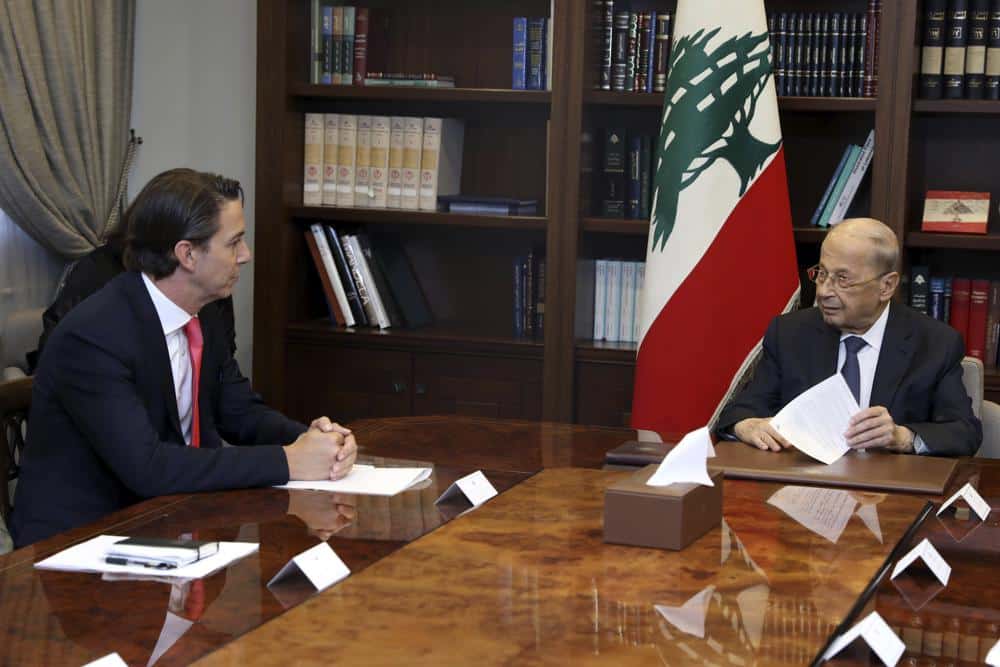The recent announcement of the Biden administration’s successful conclusion of the mediation over the Mediterranean Gas dispute between Israel and Lebanon brought a lot of mixed reviews. While both the Israeli and the Lebanese governments, and Hezbollah by extension, celebrated this supposed-feat, many critics branded this US deal as one which mainly empowers the pro-Iran axis and allows Hezbollah access to potentially millions of dollars which in turn will be used to further cement their hold over Lebanon and its people.
Contrary to the United States insistence, the Israeli-Lebanese maritime demarcation deal has nothing to do with what these two warring countries need or wish to achieve but rather with what the US needs with its ongoing confrontation with Russia and its dire need for alternative energy sources.
Yet the way that the Biden administration dealt with this energy demand, speaks volumes of their capriciousness in dealing with many of the challenges the Middle East has to offer, and that this so-called diplomatic win for Biden will sooner rather than later prove to be a mistake which will only empower the anti-western axis and further push Lebanon into the abyss.
While true that the Biden administration, through an arduous and challenging mediation led by Amos Hochstein, the Special Envoy and Coordinator for International Energy Affairs, was able to do the impossible, by convincing Hezbollah to agree to share resources with an entity that it wished to destroy, the reality of the matter is that there are no guarantees that Iran and its Lebanese proxy, or even any future Israeli cabinet, will stick to this deal.
Perhaps, more importantly, the US shortsightedness on the Israeli-Lebanon deal lies in its wishful thinking, not to say juvenile framing of the deal, at least from the Lebanese side. The US administration claim that this gas deal is the start of Lebanon’s economic recovery and that the money generated from future gas exports will allow Lebanon to will be wisely utilized to overhaul the country’s non-existent infrastructure, including the almost non-existent electricity sector, is deceptive not to say the least.
In essence, the United States is wagering on the same Lebanese political class that it has previously called out for its overindulgence in corruption and resolve in snubbing reform as a way out of their political crisis. Ironically, Hochstein’s mediation with the Lebanese state went through the deputy speaker of Parliament Elias Abu Saab, himself is a crony of Gebran Bassil, President Michel Aoun’s son-in-law, sanctioned under the Magnitsky act for “the systemic corruption in Lebanon’s political system… [ which] has helped to erode the foundation of an effective government that serves the Lebanese people.” What the US administration willingly did is to actually empower the Lebanese oligarchs which are responsible for the total collapse and thus further cement the alliance between the corrupt toxic system and the Iranian weapons that protect it.
Furthermore, while the US has underscored the urgent need for Lebanese structural reforms, this new injection of cash will also allow the Lebanese oligarchs to sidestep these much-needed reforms which were the key to unlock the loan of the International Monterey Fund, which in turn would slowly rein Lebanon back to the sphere of economic and political normalcy.
Although Lebanon certainly does not carry the same weight for the United States as the ongoing war in Ukraine and the fight over energy resources, Biden’s concession to Iran and its Lebanese proxy over the gas deal does not reflect well on the tensions with the Arab Gulf states and the OPEC+ recent decisions to cut oil production. While Saudi Arabi and the United Arab Emirates no longer look at Lebanon with the same fraternal lens as before nor do they see it as strategically important to their regional interest, the demarcation deal which further empowers the anti-Gulf axis certainly does not help ease the tensions between the Biden administration and an Arab Gulf who is no longer willing to sit aside and see Iran continue to infringe on its sovereignty as well as security.
To many, the Maritime demarcation deal is the ultimate show of realpolitik by a US administration that time and again has not practised what it preached, yet pragmatism within this context might prove to be counterproductive for the United States strategic interests as betting on the good will of the Iranian Revolutionary Guard and the Lebanese oligarchs is no short of lunacy.
The full details of the Lebanese-Israeli demarcation deal have not yet been fully disclosed and might not be for many years ahead, but until that time arrives, we are left with a few essential facts that underscore the continued failure of the successive US administrations that the empowering trying to pass on horse-trading for policy is no longer viable in the region struggling to survive.
Image Credit: Dalati Nohra via AP



















